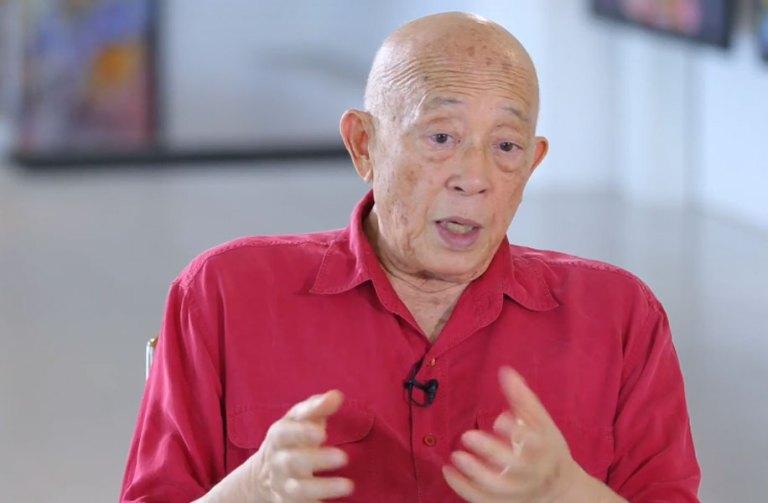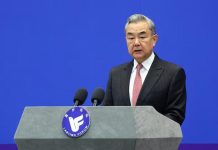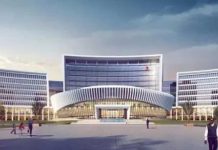Africa-Press – Mauritius. Mauritius is often cited as a great democracy. Yet several voices are heard to challenge this point of view, whether in the conduct of the elections or in the limitations faced by civil servants belonging to public or parastatal institutions.
There are also the appointments that are more like a family negotiation than a democratic exercise. And a certain way of making decisions in the name of the well-being of the population is disturbing.
Is there a culprit in this state of affairs in contemporary Mauritian society? Joseph Tsang Man King, former diplomat, minister and man of letters, answers us.
Mauritius Times: How do you view society today after the elections last December, knowing that foreign observers are satisfied with the organization? Joseph Tsang Man Kin: Good for them if they are happy, but what really matters is what Mauritians think and say.
It is up to us to be satisfied before anyone else and, as everyone knows, there are cases brought to court by political parties to challenge the validity of these elections.
I will not comment on this topic, which would only be an academic exercise. But most important, I think, is everything that happened before and during the election campaign. There has been a perversion of democracy, for two reasons.
First, the politicians do not propose any plans for a society to the people, and they did not feel obligated to publicly inform in which direction they intended to lead the people.
The people have short memories: we have forgotten the crimes against the environment with the destruction of the Passage Roland Armand or the drug mafia denounced in the Lam Shang Leen Report.
And the people, stuffed with multiple cases of corruption, seem to have become insensitive, if not indifferent and – perhaps more serious – would have wondered if it is not themselves imbecile not to take advantage of the situation and not to demand , him too, his share of the easy gain while closing his eyes .
.
. And then, it was Christmas and the presents. Then, as everyone knows, these elections took place under the auspices of the god Money.
It was the reign of money, considering the astronomical sums spent to convince, or as we often hear in the streets, to corrupt the population, or as we sometimes hear, to buy votes. The politician gives a gift to the voters, for example, a very fat pension, and in return, the latter thank him by offering him their votes.
Isn’t this corruption, this give and take between the political class and the voters? Could we compare this attitude to that of the “rodere-bouttes”, who only think about their own interests? Could it be argued that policies appeal to voter greed?
Quid pro quo, say the Americans. I find that degrading. And I wonder what politicians are saying to each other: that this population does not deserve better?
No one seems to have looked at how much money was spent on these elections. Let’s look at just one item of these expenses – banners and flags, and rental and maintenance of bases ’.
Did the Electoral Commission keep track of these expenses? Did she make arrangements to film the ‘bases’ in order to assess the amount of expenses incurred?
Does she have all the information required to enable her to judge the situation and proclaim, in her heart and soul, that there have been no irregularities and violations of the electoral law?
Is it in a position to dispute the expenditure figures put forward by the candidates? Anyway, is that part of the Electoral Commission’s duties, or does it think it is none of its business?
What is your assessment of the Government’s keynote speech? Do you see in this speech the elements that our country needs so much for the revival of the various sectors of activity, and above all to restore the confidence of young people in the future of our Republic and its institutions?
When you first listen to this keynote speech, you can’t help but get caught up in both the content and the form. We hear in the keynote speech several very interesting elements called to promote economic and financial development through the creation of new institutions and economic tools.
Of course, almost everything is there, as if the authors had before them a format with mention of all the sectors to be covered and a lexicon with all the buzzwords or expressions of economic development to be included in the speech.
An excellent exercise in style, fairly well calculated, which looks pretty and has a good effect! OK for the form. And the fund? This keynote speech does not really add anything concrete. It’s a dream, a lot of dreams, as we say in English: a lot of wishful thinking.
So we are going to do studies, a lot of studies, which will take time – several years – and above all it will cost money, a lot of money to pay to the firms chosen to undertake these studies.
Faced with this display of multiple and good intentions and the only displayed desire to produce wealth, does the Prime Minister seriously believe he can give young people confidence in the future of our country? Make no mistake: they wonder why they have to kill themselves at work if, in the end, it is for a clique or a caste of profiteers and predators to be the only beneficiaries .
.
. My point here is that to reassure young people, it takes a lot more than the money to be dangled in their eyes.
Our young people, like all young people around the world, are fed up with promises made by politicians, many of whom no longer believe because they all suspect them, unfairly of course, of corruption. It is necessary to eradicate corruption at all levels of public life, and to practice a true policy, transparency and meritocracy.
Yes, young people demand that institutions work independently of political interference; we need men of righteousness, above all suspicion, at the head of all our institutions, governmental and parastatal. The Government should come forward and say it genuinely wants to fight corruption, and especially how it is going to do it.
* Since the future and the progress of the country are closely linked to a continuous supply of local skills, fears have been expressed about the capacity of our education sector to meet the challenges that lie in wait for us in today’s competitive world.
and tomorrow. Moreover, voices were raised following the announcement of the results of the SC recently . . . How do you react to that? Certainly, we need the continued supply of local expertise and I share the concerns about our education system, but not for the same reasons.
First of all, I believe that the free education granted by the Labor Party to Mauritians has been the best thing in the world since it has enabled children of laborers and maids to access the highest responsibilities of university professors.
, directors of large companies both in Mauritius and abroad.
But why, today, these same parents want at all costs to send their children to private schools with so much bleeding? There are also private lessons that have perverted free education.
You can’t have both free education and private lessons. One or the other should be abolished. Yes, in the competitive world we need to have the highest skills.
So we must focus on training that gives access to jobs. But I believe that we would have to get out of our usual frame of thinking and think outside the box. I don’t believe that education is all about providing professional skills.
We need another look at education which is about producing good citizens, open-minded men and women, responsible and honest people, respectful of others and kind to the weak; they have to develop good principles, which makes people kind and happy, and society too.
We need to educate them, from an early age, to live in society, to control their anger and violence. I say this especially thinking of those cases of domestic violence and the tragedies that take place every week in our society.
I am thinking of the sages of ancient Rome who said mens sana in corpore sano. It is for this reason that the content of the subjects to be studied from primary to secondary level should be reviewed, because this is the very purpose of education which is to prepare for life .
– health first: until Form V, children must have as subjects of study: anatomy to understand how their body works and learn to protect and care for it;
– the diet that allows you to make the right choice of food, know how to decipher information on the composition of foods sold in supermarkets and understand the dangers of pesticides for health and the environment;
– literature to train minds, give a taste for beauty, and benchmarks and moral strength, to face the mysteries of life, and of course
– biology to understand and protect one’s environment and elements of physical science to become more reasonable, and to avoid being victims of superstition.
We should add that physical culture should be compulsory, from primary level, to help the population maintain good health, which will also save money for the Ministry of Health.
Allow me an anecdote: Former President Robert Mugabe of Zimbabwe was asked what he does to be healthy beyond his 90s. He replied that he watched his diet and did the exercises he learned in his teenage British school every day.
However, education should prepare for life, which is to know how to live with oneself and with others. * What about the 5 credits required to pass HSC?
I say without hesitation that this is a mistake. They rule out worthy and competent students who will build careers from mastering a single subject. So three credits should be enough to grant access to HSC and university. To demand the 5 credits is to deprive the country of the continuous supply of local skills that we were talking about earlier.
For this reason, I consider that attaching the fate and future of a young person to obtaining 5 credits to advance in life is unfair and even harmful, because this requirement will certainly ruin lives and prevent advancement.
of a generation. You have to look far. I am advocating here for the thousands of young people who live in anguish and tears, to ask the Minister of Education, Ms.
Dookun-Luchoomun, to please reduce the required 5 credits to just three. We will always be grateful to him. By “we” I mean not only the students, but also – seeing beyond the present time – the whole country.
On the other hand, let us not forget the young Mauritians either, and many of them return to the country to serve. We must put in place structures that reassure and welcome them.
The country needs them. * It is often politics and, in particular, political leadership that are singled out for dysfunctions and other shortcomings hampering progress and development in many countries. Is this also the case in Mauritius, according to you?
Mauritius is certainly part of this group of countries you are talking about! I could give you – without exaggerating, in less than ten minutes – a non-exhaustive list of dysfunctions, irregularities, privileges, which are fresh in the memory of any good political observer.
But I must say that the evil is deeper. As I said before, we do not have real political parties with independent members coming from diverse backgrounds and committed to the advancement of the country, who identify the country’s problems, put forward ideas, make proposals.
, discuss, agree on the objectives to be achieved and adopt a program that will serve as a roadmap or government program in the event of victory in the elections and access to the country’s leadership.
In Mauritius, there is no such thing. Sir Seewoosagur Ramgoolam found himself at one point in our history as a student in London, in the company of extraordinary men who wanted to build a just society – the Fabians.
They advocated a Welfare State, and that’s where SSR got his socialist program for the country and that’s how he fought to give us free school and free health, two fundamental pillars of Welfare State. Then, we were at the time of decolonization, which gave SSR its project of independence from the country obtained in 1968.
But after it, there was the MMM, a movement which remained a movement and did not has never become a real Party, a think tank and action group with ideas that would have matured within it to become political projects, or social projects.
Coming to power with Jugnauth and Boodhoo in 1982, the MMM has never designed any social program or adopted projects that constitute concrete achievements.
And, in this way, we took the fold and we continued with the same way of steering: it has become a habit to sail on sight. We are not used to debates, discussions, we do not have the normal practice of democracy.
We are used to spat and insults, as we saw so much during parliamentary sessions last year, still fresh in everyone’s mind. So neither in parliament nor in the parties have we become accustomed to discussing social problems or government plans.
In addition, MPs do not really care about the concerns of their constituents to the point of going to collect them and echo them in parliament. I will add to this list that there are also no university professors who shed their light on the big issues that concern everyone.
This means that we have a context that allows the government in power, and more specifically, in practice, the party leader, to be authoritarian. Thus, he can decide to completely ignore the wishes or reflections of the population.
* How do we measure the quality, or even the worth, of a politician, who also assumes the post of Prime Minister? Would it be his way to run state affairs or to deal with economic challenges?
For the moment, I see an authoritarian management, in the opacity, without dialogue with the public. Having said that, I don’t know if we have the same challenges in mind.
However, it should be noted that he has arrived with a new team who will discover the power and who will do their utmost to stay there. And above all, at the same time, this team will help him in this task. The big challenge, I believe, is to safeguard national unity and territorial integrity.
I am thinking above all of the arrival of foreigners who obtain Mauritian passports, buy residences in neighborhoods which are transformed into ghettos, which seize geometric steps, then made inaccessible to Mauritians.
They are also forming small local ghettos in parts of the island. Another challenge to be met is the issue of land grabbed by individuals and corporations. The Ramgoolam government had a great idea – to set up a Truth and Justice Commission.
The Commission published its Report, comprising several thousand pages which recount in detail the injustices done to many families for several generations.
This Report is still pending implementation! The last Jugnauth government, following the hunger strike of one of the victims of this spoliation, then promised to do everything possible and especially to set up a Land Court to do justice in this affair.
However, the victims are still waiting. We will soon know if our Prime Minister is a man who keeps his commitments. Now, most importantly, the Prime Minister’s promise to fight drugs and put all the drug lords behind bars has not been forgotten.
I am talking to you about this scourge which destroyed entire families. What are his intentions with regard to the Lam Shang Leen Commission Report? What is he waiting for to act? The whole country is waiting.
* What about the Labor and MMM opposition? The future of these two parties will have to go through renewal, in your opinion?
I am not at all worried about the Labor Party, which has a future. It is this Party, the only one, which built Mauritius before and after independence, and above all that has an ethic!
But there is a problem. All the Mauritian youth are by no means aware of what the Labor Party has done for the country. He is not taught the history of this country and young people are fed by the propaganda articles of his opponents.
One of the immediate duties for the leadership of the Party would be to mount an education and information campaign across the island with booklets, videos, cartoons, recounting the life and work of Sir Seewoosagur Ramgoolam and his team, made up of great tribunes in the service of the country.
At the same time, it is imperative to reconstitute the Constituency Labor Party (CLP) in each of the 20 constituencies to serve as meeting and training places, and thus keep the flame alight, for now and always.
This will be a first step in the return to party business. Let us remember that this Party would not have been defeated in the last election, but would have been sidelined from victory by the force of money.
But this Party has a past, a rich heritage which is our Welfare State which continues to serve the people. The Party definitely has a future: it must be ready.
* With the latest news from the Labor Party, we learn that the Politburo has just expelled four members who are asking Leader Navin Ramgoolam to leave because of the party’s performance in the last election.
How do you react to this? I think any member has the right to express disagreement with the leader and move the leader to leave. However, there are procedures and a code of conduct to follow.
Let’s see how it turned out in the British Labor Party. Several members want the departure of Jeremy Corbyn, but they will not proclaim it from all the rooftops in public.
This is an internal party matter that must be resolved within the party, with discretion and respect for standards. The leader is a leader or he is not.
He had to decide. Moreover, for the party and the Labor supporters, this decision shows that Navin Ramgoolam is determined to take things in hand. He is organizing himself for the fight and the return to business. This is what the fans have been waiting for and so they should be happy about it.
For More News And Analysis About Mauritius Follow Africa-Press







